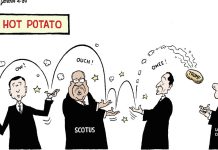By Harry McCawley
I doubt that in his 102 years of life Les Gilkey ever took the time to count the number of musical compositions he created. Many of those works were developed when he was the director of the Columbus City Band, recalled Steve McGrew, who succeeded Les in that position in 1996.
“He never charged us a cent,” Steve said recently. “It was free, even when we asked him to create a specific composition.”
One of those “freebies” has special meaning for me and just about anyone who ever worked at The Republic newspaper. It’s called “The Republic March.”
It came to mind when I learned Les had died June 29 in Jackson County. He had lived there since 1979, after retiring as director of music at Waukegan High School in Illinois for 28 years.
[sc:text-divider text-divider-title=”Story continues below gallery” ]
It was a retirement in name only. In 1986, following the death of his wife, Ruth, he agreed to tutor and work with music students in Seymour Community Schools. He was 71 years old. That same year he agreed to another request – to direct the Columbus City Band. He would serve in that capacity over the next decade.
At some point in that period he was approached by Steve McGrew and Ora Pemberton, former band director at Columbus East High School and a member of the City Band. They wanted him to create a special composition in recognition of the newspaper that had served the Columbus community for better than a century – The Republic.
To this day, Steve doesn’t recall that there was a specific reason, such as a special anniversary, for wanting to recognize the newspaper with a musical piece. Les couldn’t remember either when I talked to him about it in 2003.
“Best I can remember was that they figured it was time The Republic had its own march,” he recalled in that interview. “At the time I think there were several hundred newspaper marches floating around.”
Actually, the number is in the 450 range, according to Steve, who is pretty knowledgeable on the subject. Some of them are well-known. He thinks of the “Chicago Tribune March,” composed in the 1930s, as being among the most memorable. Personally I would put John Phillip Sousa’s “Washington Post March” at the top of the legendary chart.
Regardless of personal preferences, the notion of having your newspaper’s name on a stirring musical composition apparently caught on at some point in time, and it wasn’t limited to large metropolitan publications. In addition to The Republic there are marches named for the Danville (Ky.) Advocate Messenger and the Iola (Kansas) Register.
Unfortunately, there are no words that go with “The Republic March.” That’s left to the imagination of the listener. I’m not sure how many times the march has been performed before a local audience, but there will be at least one opportunity in the near future.
It will be performed by the band at its autumn concert in The Commons at 2 p.m. Oct. 1. That performance will have a dual purpose – to honor the newspaper for which it is named and the man who composed it.
Harry McCawley is the former associate editor of The Republic. He can be reached at [email protected].




